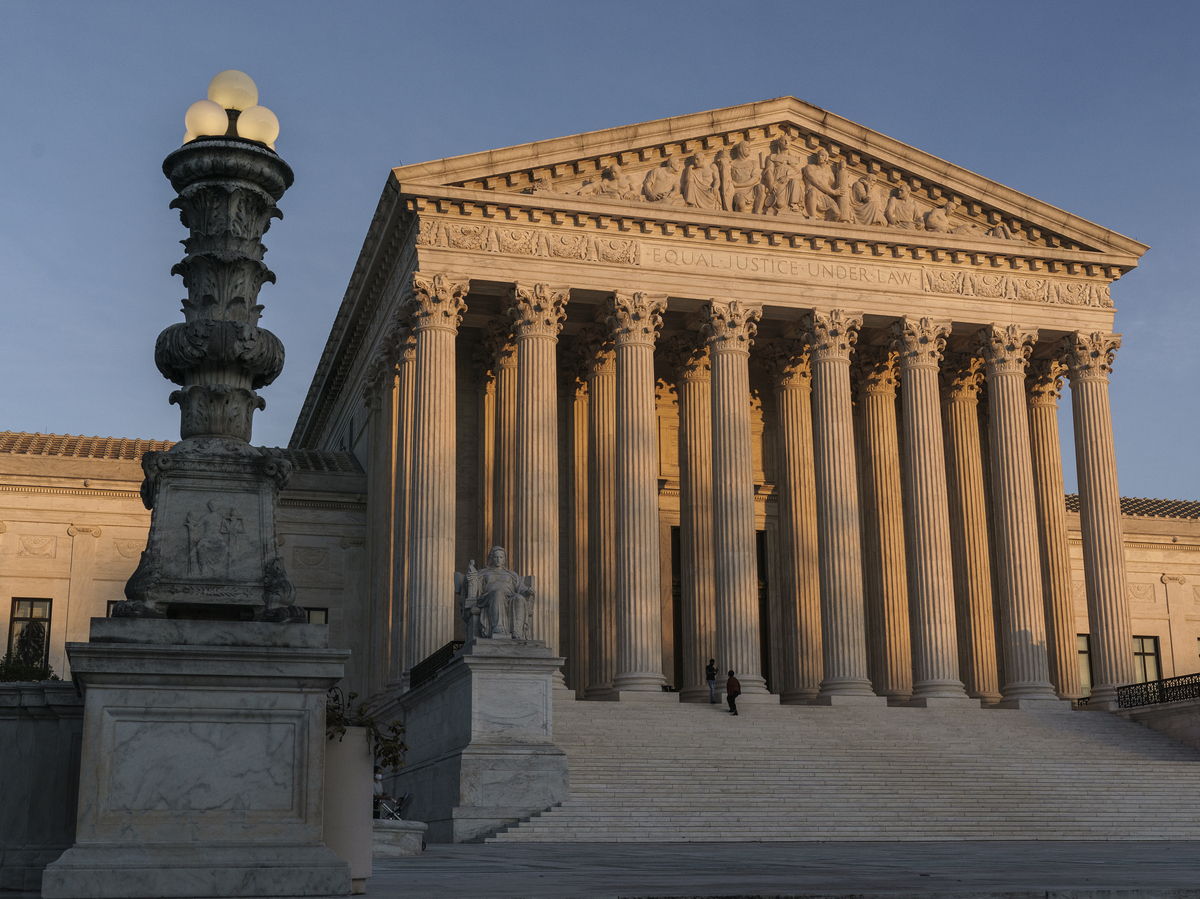The Supreme Court said California can no longer continue with a ban on indoor church services put in place amid the pandemic.
J. Scott Applewhite/AP
hide caption
toggle caption
J. Scott Applewhite/AP

The Supreme Court said California can no longer continue with a ban on indoor church services put in place amid the pandemic.
J. Scott Applewhite/AP
A divided Supreme Court has ruled that California can no longer continue with a ban on indoor church services put in place in response to the coronavirus pandemic, but said the state can keep in place restrictions on singing and chanting inside.
The two cases at the center of Friday’s rulings marked a test of how far states can go to safeguard public health before running afoul of constitutional protections for the free exercise of religion. In response to suits brought by the South Bay United Pentecostal Church in Chula Vista and the Harvest Rock Church in Pasadena, the court said California cannot bar in-person services altogether, but can limit attendance to 25%.
The churches argued that California violated their religious liberty when it moved last year to place limits on attendance at in-person worship services based on COVID-19 infection rates. In the hardest-hit areas of the state, in-person services were put on hold completely. So too was singing and chanting inside, given that the coronavirus is not only more transmissible in enclosed spaces, but that singing releases tiny droplets that carry the virus through the air.
In a concurring opinion, Chief Justice John Roberts wrote that federal courts owe “significant deference” to state officials when it comes to matters of public health, but he said such deference can only go so far.

“The State has concluded, for example, that singing indoors poses a heightened risk of transmitting COVID–19. I see no basis in this record for overriding that aspect of the state public health framework,” wrote Roberts. “At the same time, the State’s present determination — that the maximum number of adherents who can safely worship in the most cavernous cathedral is zero — appears to reflect not expertise or discretion, but instead insufficient appreciation or consideration of the interests at stake.”
The chief justice’s opinion marked a middle ground of sorts, as Friday’s ruling revealed a series of splits on the court over how much leeway states should be allowed in restricting church attendance for the sake of keeping the pandemic at bay.
Justices Neil Gorsuch and Clarence Thomas said they would have lifted California’s restrictions in full. While acknowledging that the state has a “compelling interest” in reducing the spread of COVID-19, the justices said California had effectively given preferential treatment to “lucrative industries” such as the film industry, adding that the state had “openly imposed more stringent regulations on religious institutions than on many businesses.”

“If Hollywood may host a studio audience or film a singing competition while not a single soul may enter California’s churches, synagogues, and mosques, something has gone seriously awry,” they wrote in an opinion that was joined by Justice Samuel Alito.
Justice Amy Coney Barrett, in her first signed opinion since joining the court in October, focused on the state’s restrictions on singing and chanting. In a brief opinion joined by Justice Brett Kavanaugh, Barrett said that it was up to churches to demonstrate that they were entitled to relief from the ban, but that in this case, they had not. Still, she said, it remains unsettled as to whether the ban applies evenly across the board in California or if it favors certain sectors.
“Of course, if a chorister can sing in a Hollywood studio but not in her church, California’s regulations cannot be viewed as neutral,” Barrett said.
Justices Stephen Breyer, Sonia Sotomayor and Elena Kagan said they would have left California’s restrictions in place. Writing for the court’s liberal wing, Kagan said that “Justices of this Court are not scientists,” and that opinions of the court’s more conservative members were displacing “the judgments of experts about how to respond to a raging pandemic.”

Friday’s orders seemed to further cement a shift in the court’s view on the issue following the death of Justice Ruth Bader Ginsburg. Twice before Ginsburg’s death in September, the court voted 5-4 to allow restrictions on attendance at church services put in place by California and Nevada, with Chief Justice Roberts joining the court’s liberal members in both cases. In November, with Barrett on the court, the justices ruled 5-4 to block New York from enforcing strict limits on attendance limits on places of worship in coronavirus hot spots.
“I fervently hope that the Court’s intervention will not worsen the Nation’s COVID crisis,” wrote Kagan in her dissenting opinion on Friday. “But if this decision causes suffering, we will not pay. Our marble halls are now closed to the public, and our life tenure insulates us from responsibility for our errors. That would seem good reason to avoid disrupting a State’s pandemic response. But the Court forges ahead regardless, insisting that science-based policy yield to judicial edict.”
